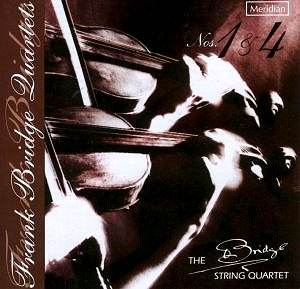This is one of a pair of discs containing Bridge's
four numbered quartets. The other disc is CDE
84311. Both discs forcefully illustrate the stylistic step-change
which divides Bridge's pre-1918 works from those written the other
side of that Great and murderous Divide of 1914-18.
The First Quartet is from 1906 when the
composer was 27 and was written for the Bologna competition. In
its torrential episodes we find parallels with the skid-sliding
lyricism of the tonally very different Fourth. This music is more
Gallic than British: early Fauré or Bonnal rather than
Howells and fresher than Stanford or Parry. The Bridge give a
good account of the work with lovely inward-playing in the multiform
lines of the adagio molto (tr.5). Grace and delicacy as
well as a healthy open air spirit dominate the Allegretto.
The bucolic exuberance of the finale is sapped by the saturation
of melodic lines (easier to discern and follow in the Continuum
recording with the Brindisi Quartet though nowhere near as generously
hearted). The clouds part soon enough and the density of lyrical
yearning is deeply affecting when it rises to almost unbearable
intensity as at 4.56. The composer's confidence in ending the
whole work with a sigh rather than an exultant shout is notable.
It is the only one of the quartets to be in four movements.
While Bax was hearing his regally relaxed Seventh
Symphony at the New York World Fair and Bliss his Lisztian Piano
Concerto, Bridge was completing the Fourth Quartet - a work from
another world altogether. Bridge, beset by illness, had had a
fallow period since 1932. This Fourth Quartet (the last)
was written in the grip of the Second Viennese school but is still
noticeably the work of a romantic. The lines are long and yearning
- Berg rather than Webern. There is little stasis here. Joy is
a presence but it is of a fleet and skittering type. While the
piece lacks the ecstatic compelling lyricism of John Foulds' Quartetto
Intimo from two years previously the slip-sliding chicane
ride of parts of the Bridge have parallels with the Foulds. The
quartet is given a completely convincing and wholeheartedly dedicated
reading by the Bridge Quartet.
Competition for this repertoire is not exactly
numerous. In the early 1970s Decca bravely issued a groundbreaking
recording of the Allegri in the uncompromising last two quartets
(never issued on CD as far as I can recall). Pearl issued the
First Quartet coupled, I think, with the String Sextet. Chandos
recorded the Second along with various succulent string quartet
genre pieces at which both Bridge and Holbrooke were practised
hands. Continuum, with grant aid from the Frank Bridge Trust,
recorded all four quartets (CCD 1035 and 1036) with the Brindisi
Quartet. This was the first complete set. The sessions took place
in December 1990 and June 1991 at St Silas Church, Kentish Town,
London. Composer Colin Matthews was the producer and the late
and much-missed John Bishop was the Executive Producer. The same
English-only essay on all four quartets appears in both Continuum
volumes. The author is Bridge-expert, Anthony Payne - the same
composer who 'realised' the Elgar Third Symphony sketches into
a symphony. The Brindisi have a leaner sound than the Bridge and
are marginally quicker on their feet in many of the movements
especially in the last two quartets.
Both the Third and Fourth Quartets were commissioned
by Elizabeth Sprague Coolidge. The Fourth was premiered at Berkshire
during Bridge's last USA visit in 1938.
The single fold of English only notes are by
Michael Schofield, violist of the Bridge Quartet.
As a good recent recording you will find
much to stimulate and enjoy in the Bridge Quartets work for Meridian.
If you have a taste for tone that is leaner and with a greater
and shriller aggression then the Continuums are probably for you.
If you prefer a warmer, closer sound then go for this admirably
presented disc.
Rob Barnett

